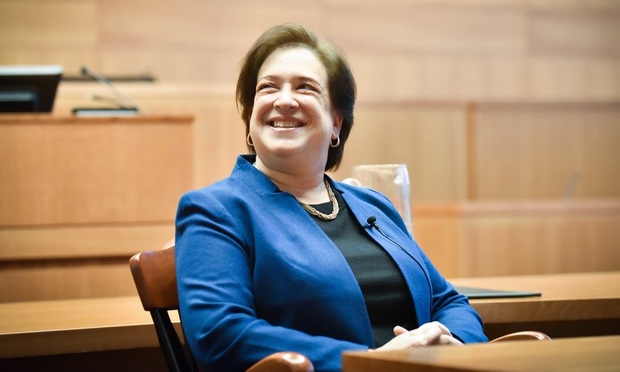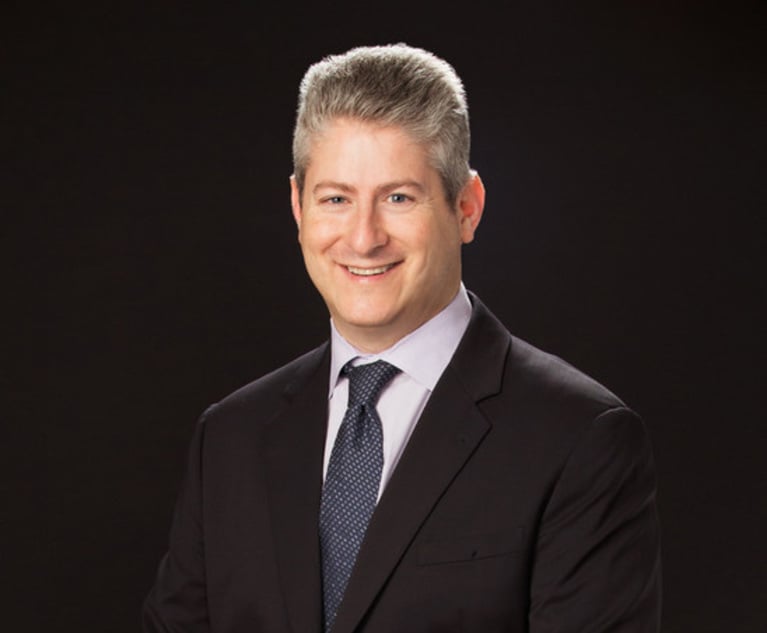Elena Kagan Named to Receive NY State Bar Association's Highest Honor
Kagan, a native of New York, joins a long line of judges, attorneys, and others within the legal profession who've received the annual award since it was first awarded in 1952.
November 25, 2019 at 11:00 AM
6 minute read
 Supreme Court Justice Elena Kagan at Fordham Law School on Feb. 4, 2019. (Photo by David Handschuh/NYLJ)
Supreme Court Justice Elena Kagan at Fordham Law School on Feb. 4, 2019. (Photo by David Handschuh/NYLJ)
U.S. Supreme Court Associate Justice Elena Kagan will be the next recipient of the New York State Bar Association's Gold Medal Award, making her only the 10th justice from the high court to be accorded the honor, which is considered among the country's most prestigious, bar leaders said Monday.
The award will be presented to Kagan at the State Bar Association's Gala Dinner, which is scheduled to be held in New York City on Jan. 30.
Hank Greenberg, the current president of the State Bar Association and a shareholder at Greenberg Traurig, said they were thrilled to have Kagan accept the award.
"It's a recognition of her extraordinary contributions to the profession, to legal education — she was the dean of Harvard Law School, to jurisprudence," Greenberg said. "We're thrilled and delighted that she's going to be accepting the award."
Kagan, a native of New York, joins a long line of judges, attorneys, and others within the legal profession who've received the annual award since it was first awarded in 1952.
The last time a judge from the nation's highest court received the award was in 2008, when it was given to retired Associate Justice Sandra Day O'Connor. Before that, Associate Justice Ruth Bader Ginsburg received it in 1995.
New York state's top judges have previously received the award as well. Chief Judge Janet DiFiore was the award's recipient last year. It was also given to former Chief Judge Judith Kaye.
"It goes to pillars of the Bar, which include judges, eminent lawyers, bar leaders," Greenberg said. "The most extraordinary jurists of the second half of the 20th century into the present have received it."
Kagan, one of those extraordinary jurists, has served on the nation's highest court for more than nine years now after she was appointed by President Barack Obama. Before that, she briefly served as the U.S. solicitor general during Obama's first term.
It wasn't the first time she worked for a president. She served in various roles during President Bill Clinton's second term in office, including associate counsel, deputy assistant to the president for domestic policy, and deputy director of the domestic policy council.
After the Clinton administration, Kagan started at Harvard Law School as a visiting professor. She became a professor of law before ascending as the 11th dean of Harvard Law School in 2003. She was there until she joined the Obama administration.
Kagan and Obama, believe it or not, had crossed paths before he chose her to lead the Solicitor General's Office. She taught at the University of Chicago Law School in the early 1990s, when Obama was also a professor there.
Kagan is a unique character on the Supreme Court. She's the only judge currently on the court who wasn't on the bench somewhere else at the time of her appointment. She is part of the high court's liberal group, but is seen as a moderate voice.
She replaced Associate Justice John Paul Stevens when he retired from the bench in 2010. It was actually the second time she was interviewed for a position on the high court, the first time being after Associate Justice David Souter retired a year earlier.
For the first post, Obama chose to nominate Associate Justice Sonia Sotomayor. Kagan told a law school audience at George Mason University recently that she didn't give up hope.
"He sort of said maybe there will be another chance," she said of Obama.
While some increasingly view the Supreme Court as an extension of the nation's partisan divide, Kagan doesn't consider her colleagues along party lines.
She told an audience at the University of California, Berkeley recently that her colleagues don't always fall where they're expected in controversial decisions, and that they're often unified on the bench.
"I think we have to understand the world we're living in and try, to the extent we can, to find common ground, to try to the extent that we can to reach consensus, to try to the extent we can to see how the world looks from another point of view," Kagan said.
Until Associate Justice Neil Gorsuch was nominated to replace the late Associate Justice Antonin Scalia in 2017, Kagan was the least senior jurist on the high court. But that hasn't stopped her from making a impression.
Kagan wrote the opinion for the court in Kimble v. Marvel Entertainment, for example, which held that a patentee can't continue to receive royalty payments after a patent has expired. The case was between a patent holder that sued Marvel over a Spider-Man toy design.
"Patents endow their holders with certain superpowers, but only for a limited time," Kagan wrote.
She also delivered strong comments in October during arguments in a case before the court, which will decide if federal law can be used to protect members of the LGBTQ community from workplace discrimination. Kagan said the law, Title VII of the Civil Rights Act, did.
"Title VII is a statute about individuals," Kagan said. "Is a particular person being treated differently because of her sex? It's as simple as looking at the language of the statute, applying it to a particular individual, which Title VII insists that you do, and coming up with the obvious answer."
Kagan is a graduate of Princeton University and Harvard Law School, where she was supervising editor of the Harvard Law Review.
READ MORE:
In LGBT Rights Case, Where Gorsuch Sees Ambiguity, Kagan Sees Clarity
Why Kagan's Best Lines, She Says, 'End Up on the Cutting-Room Floor'
Justice Kagan Sounds New Alarm as Supreme Court Scraps Another Precedent
Kagan Writes Stinging Dissent as Court Sidesteps Politically Rigged Election Maps
Scathing Death Row Dissent Highlights Kagan's Central Voice on Religion
NOT FOR REPRINT
© 2025 ALM Global, LLC, All Rights Reserved. Request academic re-use from www.copyright.com. All other uses, submit a request to [email protected]. For more information visit Asset & Logo Licensing.
You Might Like
View All

Cooley Promotes NY Office Leader to Global Litigation Department Chair

NY Judge Resigns After Avoiding Jury Duty by Telling Court He Couldn't Be Impartial

Charlie Javice Jury Will Not See Her Texts About Elizabeth Holmes
Law Firms Mentioned
Trending Stories
- 1NY Inspector General Announces Attorneys Hired to Lead Upstate Region and Gaming
- 2Carol-Lisa Phillips to Rise to Broward Chief Judge as Jack Tuter Weighs Next Move
- 3Data Breaches in UK Legal Sector Surge, According to ICO Data
- 4Georgia Law Schools Seeing 24% More Applicants This Year
- 5After Shutting USAID, Trump Eyes Department of Education, CFPB
Who Got The Work
J. Brugh Lower of Gibbons has entered an appearance for industrial equipment supplier Devco Corporation in a pending trademark infringement lawsuit. The suit, accusing the defendant of selling knock-off Graco products, was filed Dec. 18 in New Jersey District Court by Rivkin Radler on behalf of Graco Inc. and Graco Minnesota. The case, assigned to U.S. District Judge Zahid N. Quraishi, is 3:24-cv-11294, Graco Inc. et al v. Devco Corporation.
Who Got The Work
Rebecca Maller-Stein and Kent A. Yalowitz of Arnold & Porter Kaye Scholer have entered their appearances for Hanaco Venture Capital and its executives, Lior Prosor and David Frankel, in a pending securities lawsuit. The action, filed on Dec. 24 in New York Southern District Court by Zell, Aron & Co. on behalf of Goldeneye Advisors, accuses the defendants of negligently and fraudulently managing the plaintiff's $1 million investment. The case, assigned to U.S. District Judge Vernon S. Broderick, is 1:24-cv-09918, Goldeneye Advisors, LLC v. Hanaco Venture Capital, Ltd. et al.
Who Got The Work
Attorneys from A&O Shearman has stepped in as defense counsel for Toronto-Dominion Bank and other defendants in a pending securities class action. The suit, filed Dec. 11 in New York Southern District Court by Bleichmar Fonti & Auld, accuses the defendants of concealing the bank's 'pervasive' deficiencies in regards to its compliance with the Bank Secrecy Act and the quality of its anti-money laundering controls. The case, assigned to U.S. District Judge Arun Subramanian, is 1:24-cv-09445, Gonzalez v. The Toronto-Dominion Bank et al.
Who Got The Work
Crown Castle International, a Pennsylvania company providing shared communications infrastructure, has turned to Luke D. Wolf of Gordon Rees Scully Mansukhani to fend off a pending breach-of-contract lawsuit. The court action, filed Nov. 25 in Michigan Eastern District Court by Hooper Hathaway PC on behalf of The Town Residences LLC, accuses Crown Castle of failing to transfer approximately $30,000 in utility payments from T-Mobile in breach of a roof-top lease and assignment agreement. The case, assigned to U.S. District Judge Susan K. Declercq, is 2:24-cv-13131, The Town Residences LLC v. T-Mobile US, Inc. et al.
Who Got The Work
Wilfred P. Coronato and Daniel M. Schwartz of McCarter & English have stepped in as defense counsel to Electrolux Home Products Inc. in a pending product liability lawsuit. The court action, filed Nov. 26 in New York Eastern District Court by Poulos Lopiccolo PC and Nagel Rice LLP on behalf of David Stern, alleges that the defendant's refrigerators’ drawers and shelving repeatedly break and fall apart within months after purchase. The case, assigned to U.S. District Judge Joan M. Azrack, is 2:24-cv-08204, Stern v. Electrolux Home Products, Inc.
Featured Firms
Law Offices of Gary Martin Hays & Associates, P.C.
(470) 294-1674
Law Offices of Mark E. Salomone
(857) 444-6468
Smith & Hassler
(713) 739-1250






